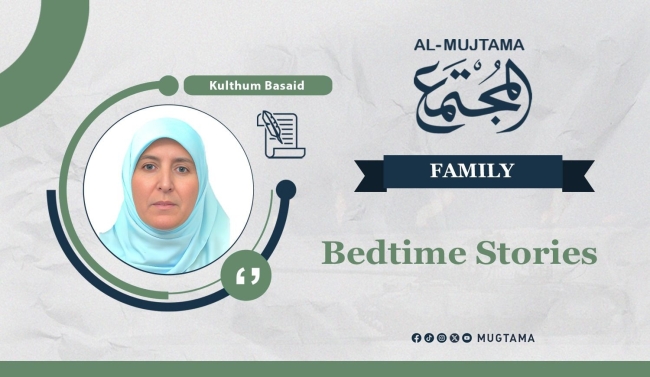The connection children have with bedtime stories is remarkable. They eagerly anticipate them every night, finding joy and engaging their imaginations with what they hear. They may even grow attached to a specific story, requesting it repeatedly without ever tiring of its retelling.
Parents who overlook or neglect the value of bedtime stories deprive their children of a significant means of developing cognitive abilities and acquiring skills such as focus, critical thinking, and the ability to visualize characters and events.
In the past, grandparents often played this role when families lived as extended households under one roof. However, as modern families emerged and parents faced increasing responsibilities to provide a comfortable life for their children, bedtime stories were often deemed an unnecessary luxury. Parents now prioritize providing good food, fine clothing, and an array of toys, believing these are sufficient, while dismissing storytelling as expendable.
In reality, stories have profound psychological, social, and behavioral impacts. According to Gemma Malley, Director of Communications for the children’s charity Book Trust in the UK, parents often struggle to dedicate time to reading bedtime stories. Yet, just 10 minutes of shared reading each day can make a significant difference. It helps build children's language skills, resilience, confidence, and imagination, while fostering family bonds.
Parents do not need to be skilled storytellers. Stories are widely available in formats they can read to their children. Today, parents may not need to improvise tales but simply read aloud from engaging materials. Numerous studies, including those endorsed by the American Academy of Pediatrics, emphasize the importance of reading to children for brain development. Regular reading stimulates optimal brain patterns, strengthens parent-child relationships during crucial developmental phases, builds language skills, promotes literacy, and enhances social and emotional growth that lasts a lifetime.
Children learn language by listening before they can write or read. Storytelling offers an opportunity to acquire vocabulary. Each story introduces new adventures, events, expressions, concepts, and names, enriching the child’s linguistic reservoir. This, in turn, helps children articulate their emotions, perspectives, and ideas clearly and effectively. Remarkably, children exposed to storytelling develop a more logical use of language compared to those deprived of such experiences.
A study conducted by Rhode Island Hospital found that infants who were regularly read to had a richer vocabulary and a greater ability to comprehend words than those who were not.
Stories can be told in colloquial dialects or classical Arabic, or a combination of both. While children need to learn colloquial dialects to communicate with their immediate environment, classical Arabic is essential for their cultural, intellectual, and educational development.
Properly spoken classical Arabic embeds itself in a child's mind, shaping their language naturally as they mimic what they hear. This linguistic foundation ensures fluency and correctness, even before learning grammar formally in school. When children encounter grammatical rules later, they simply formalize patterns they were already intuitively applying.
A key objective is to cultivate a natural linguistic accuracy that avoids the errors widespread among Arabic speakers today. If parents are proficient in Arabic and make few or no linguistic errors, their storytelling offers immense benefit to their children, who will emulate their parents in language and expression.
However, if parents struggle with Arabic or are prone to linguistic errors, it is better for them to read from vowelized texts available in storybooks. They should ensure correct pronunciation and articulation, maintaining the integrity of words and grammatical structures.
A challenge arises when parents prioritize their dialect over standard Arabic. For instance, some replace the letter qaf with alif (as in Cairo and Tlemcen), pronounce it as ghain (as in Sudan), or substitute ghain with qaf (as in parts of Algeria), or even replace it with kaf (as in some Palestinian accents). Other examples include confusion between dhad and dhaa, or replacing the hamza with ‘ain.
For parents unable to narrate stories fluently or read vowelized texts without errors, numerous Arabic stories are now available online. They can play these audio or video stories for their children. Visual elements such as illustrations and animations enhance the child’s engagement, combining auditory and visual stimulation.
Today, the availability of such resources eliminates much of the difficulty parents might face. Parents need only recognize the importance of their role in fostering their children's linguistic development through storytelling. By doing so, they plant seeds that will bear fruitful outcomes in the future. Stories heard in childhood will support their children’s progress in later life, enabling them to excel in a world where identity and cultural preservation are vital for success.
-------------------------------------------------------------


